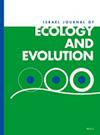Does a bacterial infection lead to a nutritional deficiency in foraging Allenby’s gerbils?
IF 0.8
4区 环境科学与生态学
Q3 ECOLOGY
引用次数: 0
Abstract
Bacterial infections can have both direct (physiological) and indirect (ecological) costs for their hosts. The direct costs of infection may include nutritional deficiencies, which reduce body condition over time, and result in the hosts modifying their foraging behaviour to compensate for any losses. Allenby’s gerbils are commonly infected with the Mycoplasma haemomuris-like bacteria, which may induce choline (essential vitamin) and arginine (amino acid) deficiencies. Gerbils should therefore alter their behaviour to make up for any shortfalls in nutrient production and retention. We tested two predictions. 1) infected gerbils would compensate for nutrient losses by spending more time foraging in patches, including, during riskier periods of owl presence, and in riskier open microhabitats. Furthermore, infected gerbils would preferentially forage from patches supplemented with choline and arginine enriched food over control food. 2) Alternatively, if infection did not create a nutrient deficiency, then infected individuals would display a similar pattern of patch use to uninfected individuals, and harvest similar amounts of food from supplemented and control patches. Our findings supported the second prediction. There was no observed difference in foraging behaviour between infected and uninfected individuals. Moreover, infected gerbils did not selectively forage more intensively from food patches enriched with either choline or arginine seed over the control patches. These results suggest that this bacteria-gerbil interaction does not result in a nutrient deficiency as observed for other Mycoplasma-rodent systems.细菌感染会导致觅食的艾伦比沙鼠营养不足吗?
细菌感染对宿主有直接(生理)和间接(生态)代价。感染的直接代价可能包括营养缺乏,随着时间的推移会降低身体状况,并导致宿主改变其觅食行为以补偿任何损失。艾伦比沙鼠通常感染类似血尿支原体的细菌,这可能导致胆碱(必需维生素)和精氨酸(氨基酸)缺乏。因此,沙鼠应该改变它们的行为,以弥补营养生产和保留的任何不足。我们测试了两种预测。1)受感染的沙鼠会通过花更多的时间在斑块中觅食来弥补营养损失,包括在猫头鹰存在的危险时期,以及在危险的开放微栖息地。此外,感染沙鼠更倾向于从富含胆碱和精氨酸的食物中觅食,而不是从对照食物中觅食。2)或者,如果感染没有造成营养缺乏,那么受感染的个体将显示出与未受感染的个体相似的斑块使用模式,并从补充和对照斑块中收获相似数量的食物。我们的发现支持了第二个预测。在感染和未感染的个体之间,没有观察到觅食行为的差异。此外,受感染的沙鼠没有选择性地在富含胆碱或精氨酸种子的食物斑块中比对照斑块更密集地觅食。这些结果表明,这种细菌-沙鼠相互作用不会像其他支原体-啮齿动物系统那样导致营养缺乏。
本文章由计算机程序翻译,如有差异,请以英文原文为准。
求助全文
约1分钟内获得全文
求助全文
来源期刊

Israel Journal of Ecology & Evolution
环境科学-进化生物学
CiteScore
2.10
自引率
0.00%
发文量
7
审稿时长
>36 weeks
期刊介绍:
The Israel Journal of Ecology and Evolution includes high-quality original research and review papers that advance our knowledge and understanding of the function, diversity, abundance, distribution, and evolution of organisms. We give equal consideration to all submissions regardless of geography.
 求助内容:
求助内容: 应助结果提醒方式:
应助结果提醒方式:


